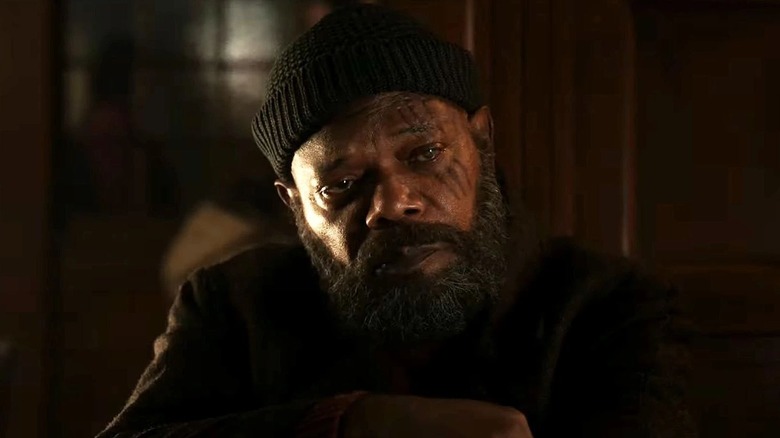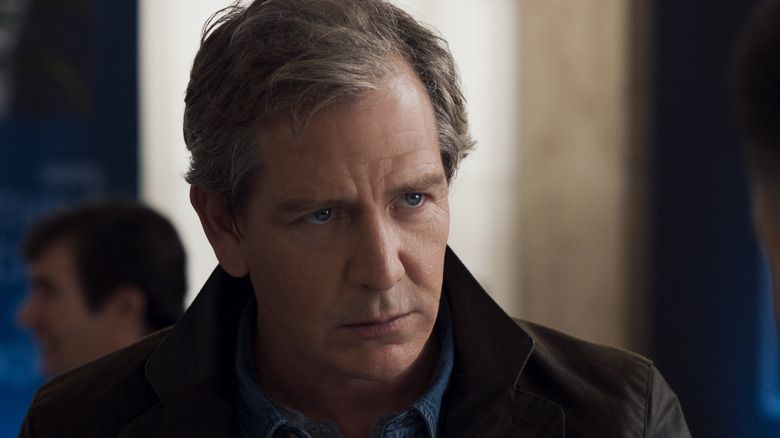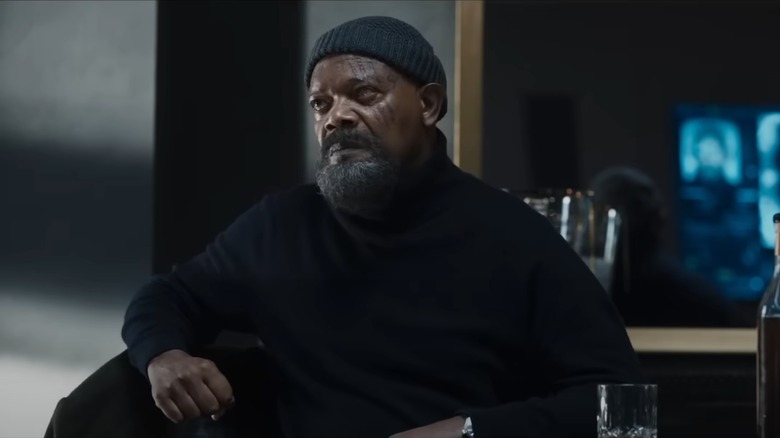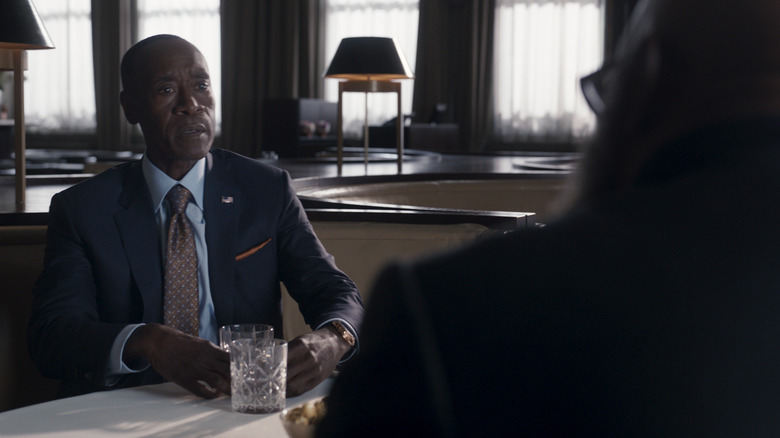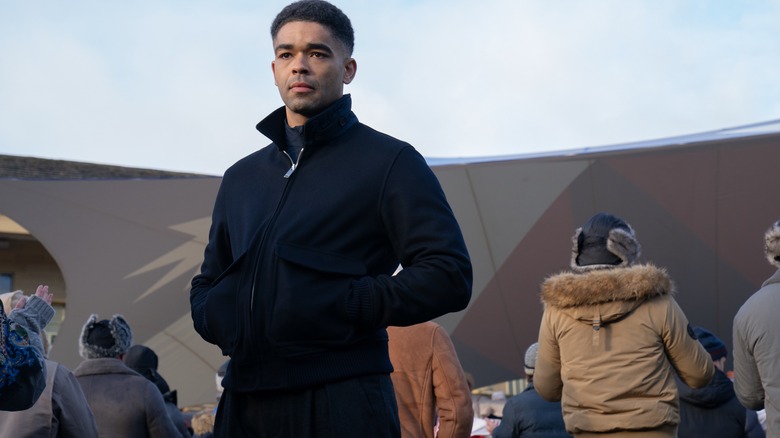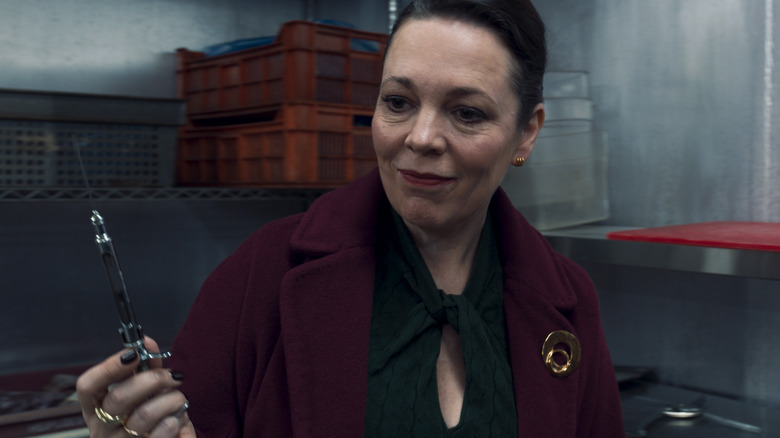Secret Invasion Episode 2 Course-Corrects By Unmasking The Man Beneath The Myth Of Nick Fury
In our recap of the "Secret Invasion" premiere (titled "Resurrection), we noted that the saving grace for a rather uneven debut episode came from the fact that, not unlike the series itself, Samuel L. Jackson's Nick Fury enters the fray with a chip on his shoulder. Accused of having lost his way since the events of "Avengers: Endgame" and facing mounting criticism that his approach no longer works in a world that's moved past him, well, it doesn't take much critical analysis to note the parallels between this older, more tired, and deeply broken Fury and the post-"Endgame" Marvel Cinematic Universe itself. Although not quite comparable to the troubles that continue to plague its DC counterparts, it's safe to say that this franchise has something to prove as we enter this second week into Marvel's first foray into an espionage series.
For the most part, episode 2 manages to take what worked the first time around — and, incidentally, do a little backtracking on what didn't — by focusing on the man behind the myth and legend of Nick Fury. Despite his outsized role in the MCU at large, having been responsible for uniting the Avengers in the first place, the character has remained a cipher to this point. Fury has spent much of his time since dealing with relatively smaller-scale concerns — thwarting HYDRA's attempted takeover of SHIELD in "The Winter Soldier," staging a last-second rescue of Sokovia in "Age of Ultron," and ultimately blasting off into space after the events of "Avengers: Endgame" (remember, the Fury we saw in "Spider-Man: Far From Home" was actually Talos impersonating his old friend). Of course, there was also that prequel detour he took with Brie Larson's Carol Danvers in "Captain Marvel," which looms so large in "Secret Invasion."
But now he's now in for a reckoning, as the series begins to unpeel the layers and reveal the refreshingly flawed humanity behind his carefully-crafted, super-spy façade.
Tying off loose ends
One of the biggest reasons "Secret Invasion" got off to such a rocky start last week came from its refusal (or was it just plain indifference?) to properly provide any real context for newcomers. Yes, it's fair to expect viewers to have a baseline knowledge of Skrulls, their ability to shapeshift, and the threat they potentially pose should any of them decide to turn on humanity — which, admittedly, the opening scene in the premiere conveys rather efficiently. But how much of the audience could reasonably be expected to remember who Ben Mendelsohn's Talos was from "Captain Marvel," quickly grasp that his wife Soren (Sharon Blynn) apparently died off-screen since we last saw her impersonating Cobie Smulders' Maria Hill in the post-credits scene of "Spider-Man: Far From Home," and simply go along with the numerous references to a vague "promise" that Fury and Talos once made to the Skrulls who've since joined Gravik's (Kingsley Ben-Adir) cause?
Well, episode 2 (directed once again by Ali Selim and credited to writer Brian Tucker, who co-shares "Story by" credit with Brant Englestein) finally realizes that all this information is actually kind of important. We kick things off with a sorely-needed "Previously on the MCU" segment explaining the whole deal with the Skrulls, as established in "Captain Marvel," and a subsequent scene set in 1995, two years after Carol Danvers has flown away into the cosmos. Here, digitally de-aged Nick Fury meets young Gravik for the first time, a survivor of the Kree/Skrull war that has turned this entire species into refugees in need of a new home and, based on his considerable skills at such an early age, someone who Fury could unlock to his full potential. Once the pleasantries are taken care of, we learn the promise that Fury swore to all Skrulls: that if they help protect Earth from threats, he'll help them find a new home.
Doesn't that go a long way towards explaining much of Gravik and G'iah's (Emilia Clarke) actions in the premiere? Yup! Is there any reason why this crucial detail had to be held back until now, leaving viewers in the dark for a whole week? Not really! But, with the fundamentals belatedly taken care of, at least the rest of the episode is free to move things forward.
Fast and Fury-ous (sorry)
After the opening table setting, the present-day storyline picks up with Talos and Fury making their escape in the aftermath of the deadly Moscow terrorist attack. Cooped up in together a train and reeling from Gravik's murder of Hill and thousands more, Fury attempts to come to terms with the magnitude of their failure. And there's only one person left to bear the brunt of Fury's, well, fury: Talos.
This is the first of many terse conversations layered throughout the surprisingly dialogue-heavy hour, heightened by Fury's disarming childhood story about playing "Tell me something I don't know" with his mother (which echoes the story about his grandfather that he tells Steve Rogers in "Captain America: The Winter Soldier") before he turns the tables and wrings the truth out of Talos about the Skrull migration to Earth. As it turns out, the planet has been the unknowing host to over a million shapeshifters, placing Fury and Talos at a critical impasse over their respective mistakes from the past. For Talos, it was his choice to lie to Fury about how many Skrull refugees are now living among humanity. For Fury, it was fleeing Earth in the first place and leaving Talos and the Skrulls to figure out their own problems themselves. Some would argue that nothing is resolved by the time both individuals angrily go their own separate ways and that this doesn't "move the plot forward," but this is precisely the kind of quiet, character-driven moment that the MCU has neglected for far too long and is twice as necessary in slow-burning, serialized shows like this one.
Damaged individuals puncturing Fury's once-mystical aura proves to be a running trend in episode 2, with Maria Hill's mother doing much the same soon after he ends up back in London. Escorting the body of his fallen friend for a military burial and confronted by the grieving mother, the former SHIELD director is promptly taken to task once she learns that he's ultimately to blame for her daughter's death. "You're Nick Fury," she brutally reminds him when he apologizes for not being able to do more to save Maria. Fury's reputation continues to take hits when Gravik and G'iah are on their way to the Skrull Council meeting. Correctly intuiting that hurting Fury through Maria would be much more meaningful than simply murdering him in cold blood in the moments after the Moscow bombing, Gravik correctly observes that, "You don't punish a man by giving him what he wants."
Help a brother out
Talk about a meeting years in the making. It should come as no surprise that the moment when Fury and James Rhodes (Don Cheadle) finally cross paths in the MCU turns out to be far and away the highlight of the hour. Yes, the teleplay takes the somewhat self-aggrandizing approach of treating them as if they've had decades of personal and professional interactions between them (which they constantly allude to, but we've conveniently never seen before), but the crackling chemistry erupting between the two as they disagree over the optics of Fury's actions in Moscow more than makes up for just how long overdue this interaction really is.
More to the point, the episode makes a compelling argument that Rhodey is absolutely right to rip Fury a new one. Although he aggressively denies Fury's role in the Moscow affair in front of the various heads of state of other nations in the previous scene, such willingness to protect the agent at all costs is all but exhausted by the time the two share their afternoon rendezvous in that empty lounge. Much like how half of the Avengers before him responded to the Sokovia Accords in "Captain America: Civil War," Fury simply can't accept Rhodey's uncompromising sense of oversight over his reckless actions on foreign soil. Although Fury earnestly appeals to their shared struggles as Black men in a white man's world, Rhodey admits he actually volunteered for the duty of firing his compatriot and putting an end to the wayward director's sense of entitlement. As Fury storms out and refuses to comply, his one last declaration that "I'm Nick Fury. Even when I'm out, I'm in," indicates that he's internalized all the wrong lessons from his earlier exchange with Mrs. Hill.
Desperate at all costs to ensure that Maria's death wasn't in vain and still alarmingly high on his own supply, Fury walks further and further down a very dangerous path. Future episodes will certainly have their work cut out for them to keep this fascinating arc moving in the right direction, but the final scene sure keeps us on our toes. Arriving at what sure seems like his house, we see a Skrull chopping some vegetables in the kitchen. Once Fury arrives, she changes into a human, chides him for forgetting to slip on his wedding band once he came home, and kisses him. Did Fury secretly marry a Skrull? Did a Skrull impersonate his wife? Either way, it's yet another detail that makes Fury that much more human.
General Gravik
After the premiere mostly treated Gravik's rebellious faction as a largely standalone faction of Skrulls with very limited reach, episode 2 provides some plot development and background information on just how far-reaching his plans extend. An early scene shows Gravik and G'iah crashing a meeting between Skrulls in very high-profile positions in international politics. Although it's kept frustratingly unclear whether they actually worked their way up into these roles over the last three decades or simply kidnapped these individuals to make use of their "shells," the result is the same. Gravik successfully orchestrates a coup over the Skrull Council and installs himself as the newfound Skrull general for their impending invasion attempt.
But most importantly, we get a new look at Gravik's motivations. Not only has his grudge over Fury's broken promise festered over the last 30 years, but he's convinced himself and his followers that humanity has brought about their own impending destruction. Name-checking our well-established history of war, oppression, and destruction of our own environment, it actually makes quite a lot of sense why the Skrulls would see themselves as much more worthy inheritors to Earth than actual humans. If you remember, last week's recap alluded to Marvel's rather lazy tendency to undercut the very understandable gripes that villains have with the Avengers and the world at large by giving them a bloodthirsty taste for murder. By watering down their worldviews to, "Well, they make a lot of great points that the heroes really ought to address ... but they just keep killing people, so they have to be stopped," the franchise keeps giving each movie and show a pass to maintain the status quo. Here, however, Gravik's ruthless killing of innocents actually plays into his cynical worldview. As a childhood survivor of the Kree/Skrull war and fixated on establishing a new home for his people, he sees his terrorist actions as nothing more than "hastening the inevitable."
Swayed by his unquestioning resolve and a promise of his own that "loyalty will be repaid," Gravik's grand speech to the Skrull Council leads to a creepy inversion of the episode's first scene. Where sympathetic Skrulls once transformed into humans to indicate their trust in Fury and Talos, now the Skrull leaders in human disguise transform back into their natural form as they ally themselves with the newly-minted General. Here's hoping the Skrull storyline of villains receives an even bigger (and more nuanced) spotlight moving forward.
Stray thoughts
- Colman's Corner: So much to get through in this episode and we didn't even talk about Olivia Colman's reappearance as the delightful Sonya Falsworth! Here, she shows up to crash the Russians' interrogation of John Brogan (Ben Peel), or rather the Skrull impersonating the human who was once part of the Americans Against Russia terrorist group. Searching for information on Gravik, Falsworth summarily removes him of his Skrull pinky finger and tortures him in one of the more brutal scenes in all the MCU. In fact, once Gravik shows up to rescue his captured soldier, the combination of brutal gun fights, knife play (with visible blood squibs, huzzah!), and even the act of hanging a poor victim on a meat hook all make this the standout action sequence of the entire show so far.
- Fit for a King: Gravik's still not the most fully-fleshed out Marvel villain ever, but Kingsley Ben-Adir's quiet and reserved performance continues to do the most heavy lifting to sell us on Gravik's barely-repressed rage. Marvel continues to hit it out of the park with their casting, although I'd love to see Emilia Clarke get more to do than play quiet reservation at all the horror her boss unleashes around her. She does this very well, mind you, especially towards the end of the episode when Brogan is shot dead for giving up information on a Skrull safehouse to Falsworth. As the camera trains on Clarke's face while the muzzle flash goes off in the background, director Ali Selim's choice to focus on her as she blinks away tears rather than showing the execution itself was highly effective.
- Secret Labs and Super-Skrulls: But wait! That's not all Brogan gives up to Sonya Falsworth. He also reveals what G'iah discovered for herself earlier in the episode — that Gravik is employing the skills of Doctor Rosa Dalton (and her husband, apparently) to build some sort of machine that, according to Brogan, will "make us stronger." While snooping around, G'iah overhears some troubling snippets of conversation about "DNA selection" and repeated references to "the harvest," confirmed by the computer screen displaying DNA samples from a host of MCU creatures like Groot, the Frost Beast from Jotunheim last seen frolicking around on Earth in the "Thor: The Dark World" post-credits scene, Cull Obsidian's severed hand left behind in New York early on in "Avengers: Infinity War," and even the Extremis virus from "Iron Man 3." Fans can likely guess that this is leading to the Super-Skrulls, which has been all but inevitable given the material this series is (loosely) adapting.
- Politics, Shmolitics: Nobody's ever accused the MCU of possessing a particularly keen eye for political commentary, but I have to draw the line at the Fox News riff where the blatant Tucker Carlson stand-in rails against the narrative that the Moscow attack was conducted by the fringe group Americans Against Russia, insisting that patriotic Americans would simply never do such a thing. I have nothing against taking potshots at Fox News, mind you, but the fact that this unhinged lunatic is technically correct that it actually was a false flag operation only makes the metaphor of Skrull refugees carrying out terrorist attacks even more uncomfortable than it already was.
- Friends in High Places: Episode 2 makes the most overt references to the Avengers yet, with both Gravik and Rhodey separately questioning the possibility of the superheroes crashing this party. This has the fun side-effect of directly addressing a common fan complaint about why Marvel characters can't simply call them in during every movie or show. Here, it makes perfect logical sense that they wouldn't want to summon any famous, super-powered individual who could then be impersonated by Skrulls and turned into their own weapons. As for Gravik, he insists that he's already taken such possibilities under consideration.
- The Elephant in the Room: Yeah, it's time to address the very icky reveal that the opening credits sequence was actually created with the use of AI, which fully deserves all the ire it's received online. It's a neat concept with arguably cool-looking results ... but come on, Marvel. Pulling this stunt in the middle of a writer's strike and barely a year removed from VFX artists speaking up about being mistreated? Read the room, guys!
